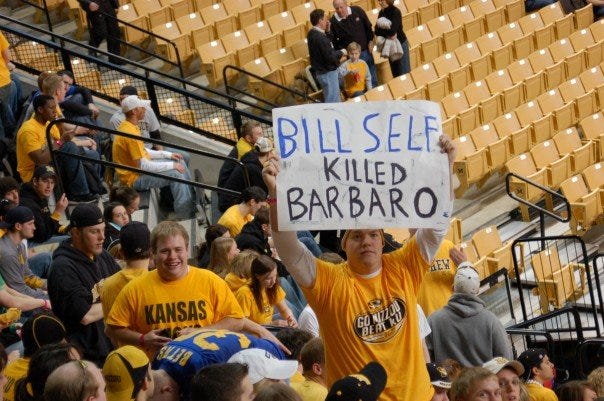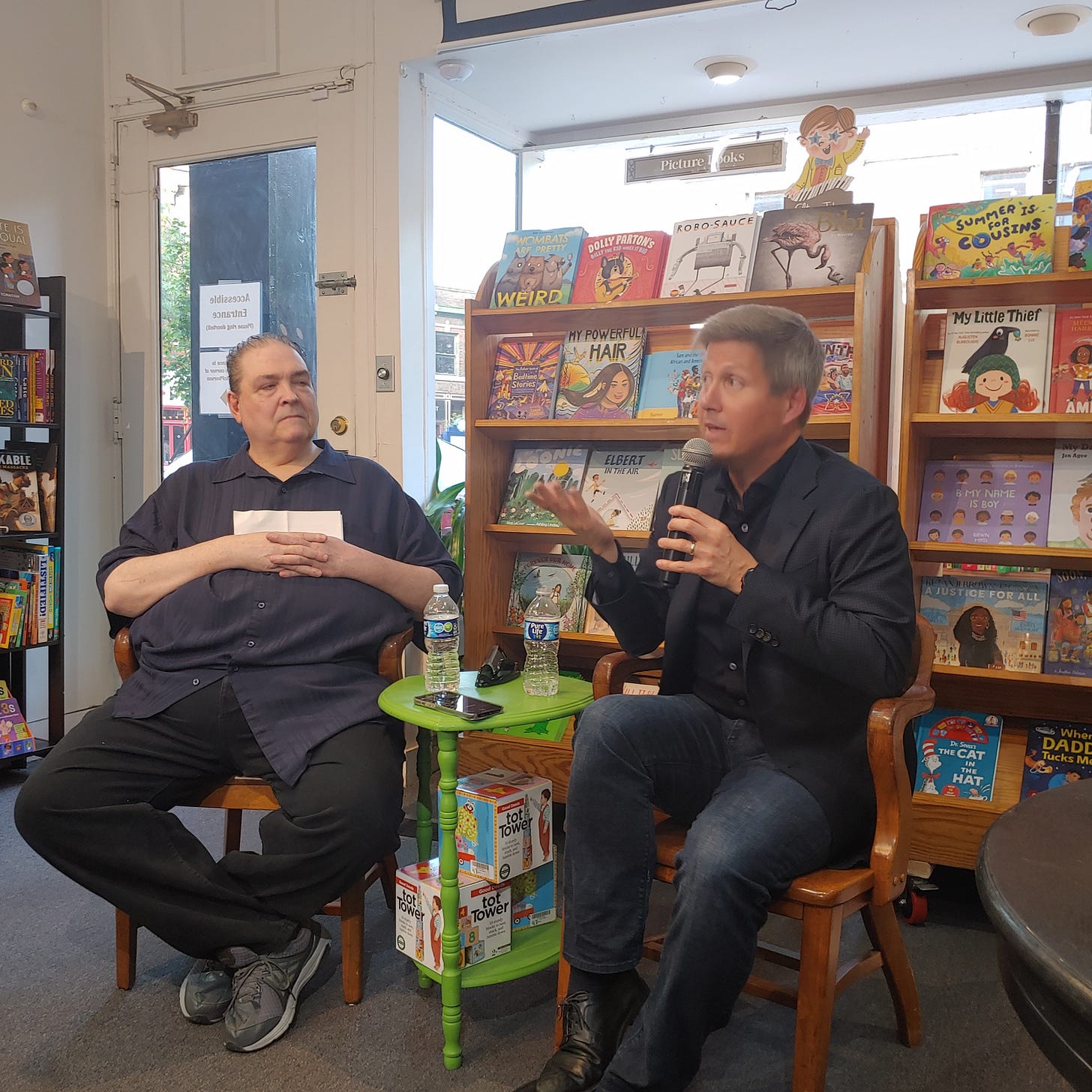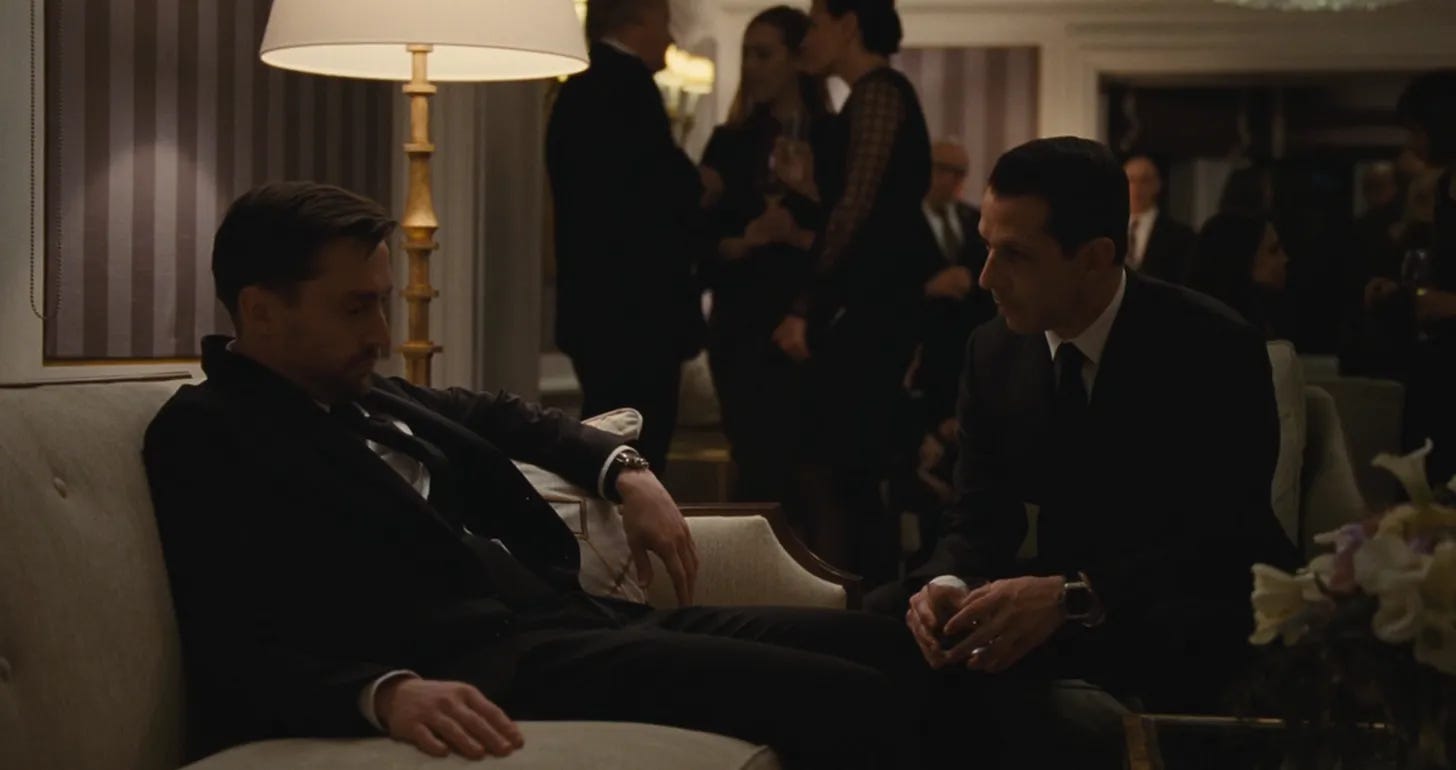Volume 4, Issue 70: Adam Wainwright
"He's not the same Adam Wainwright we saw decades ago. But he still has that curveball."
Hey, the book’s out. If you haven’t bought it yet, you should. If you have, you should write a (hopefully positive!) review of it on Goodreads or Amazon or both. I hope those of you who have a copy are enjoying it.
Also, if you live in Los Angeles, you should come out and see A.J. Daulerio and me at Chevalier’s Books THIS FRIDAY NIGHT JUNE 2 AT 6 P.M. PT. You can find more details right here. Come on out, we’ll have a blast.
A few years back, I went out for drinks with the New York Times writer Sopan Deb during one of my trips into the city. I’d been an admirer of his political reporting—he covered the 2016 Trump campaign for CBS News but now covers the NBA for the Times, a much healthier beat—and we had a great time. He was smart, clever and insightful, an absolute blast to talk to. I’m glad to live in Georgia now, outside of the media bubble of New York, and I find myself exhausted by most Serious Conversations About The State Of The Media, but I am very much not above the high of sitting down with a fellow journalist and just shooting the shit about the business every once in a while. Sopan is a guy I could talk to about journalism, or really anything, for hours.
When we came to the end of our night, I clinked my glass to his and thanked him for coming out: We gotta do this again sometime, man. He then stopped me.
“I gotta tell you something,” he said. “It really is wild to meet you. I read Deadspin in college, like, obsessively. It was a real inspiration and was one of the things that made me want to get into journalism. So thank you.”
I know this was supposed to be flattering, and, really, it was. But five years later, I find myself still thinking about it. Sopan said it in a kind, very sincere way, with a tone that made it clear it was important to him that he say it—that it meant something for him to tell me that personally, face to face. I recognized it because it’s what I used to say to the people who inspired me when I was a young writer: Roger Ebert, Roger Angell, Pat Jordan, Sally Jenkins, Bernie Miklasz. But then I remembered what was implicit in my saying it: Thank you for inspiring me. I am now ready to take what I have learned from you and take over for you, because I am the future and you are the past. I said it, whether I realized it or not, because I wanted to be the person they passed the torch to. I said it because I was young and ambitious and hungry enough that I thought their time was over.
Sopan surely did not mean it that way, or at least did not do so consciously. Quite the opposite: It was clear that he was quite emotional saying it, like he’d been waiting to do it for a long time. I had felt the same way when I said it to Ebert, or Sally, or whoever. But I did also want to take over. Thanking them for what they had meant to me in the past was a way of transitioning into the present, a present I believed to be my time. I was, essentially, thanking them for their service, services that were no longer required. I was telling them, again, without realizing it, that their stories had already been told. That they were over.
Sopan wasn’t saying any of this. That did not change the fact that it was how I heard it. And how I still do.
I’ve always marvelled at musicians who, despite all the work they’ve done over their entire careers, still are expected to play their biggest hits at every show, for the millionth time, even though those songs are decades old and might as well have been written by a different person entirely. I mean, Keith Richards wrote the “Satisfaction” guitar riff in 1964, a full 59 years ago. The number of different experiences Keith Richards has had in his life during those 59 years bends toward the infinite; add up the lifetime of you and your friends and everyone else you know and I’m not sure it would add up to the totality of the things Keith Richards has done in his life. The Keith Richards of 2023 has nothing to do with the Keith Richards of 1964. But he’ll still be forever known for that riff, and expected to bust it out at a moment’s notice. It must feel, at least a little, like a lie.
Next week, it will mark 16 years since I announced that I was leaving Deadspin, the site that I founded in 2005. Sixteen years is a shockingly long period of time: A child born that day is about to get their driver’s license, Madonna was on the Billboard Top 10 that day, the current starting shortstop for the Yankees had just turned seven. I wouldn’t say I’ve packed in a Richards-esque lifetime of experiences in those 16 years, but a lot has happened: I’ve gotten married, I’ve become a father (twice), I’ve written three books, two of them novels that have shifted the direction of my career entirely, I’ve covered the worst Presidential election possible, I’ve despaired for a world I once foolishly thought to be stable, I’ve moved to Georgia, I’ve quit smoking, I’ve started running 30 miles a week, my hair is graying, I’ve bought a house, I groan a little bit when I get out of my chair when I’ve been sitting too long, I’ve made new friends, I’ve lost old ones, I’ve laughed, I’ve grieved, I’ve had my worldview turned upside down a thousand times over, I learn something new every day, I forget something old at roughly the same rate. I’ve been busy living.
About a month before I left Deadspin, I sat on a sports journalism panel with various “sports media professionals,” mostly old white dudes who had expected me to come in wearing a spiked black leather jacket with a mohawk, screaming “screw you and your media!” rather than being a Midwestern dork with a blazer, a Raconteurs concert T-shirt and a terrible haircut. (At one point during this panel, an ESPN executive asked me if the reason I kept getting internal scoops about the company was because I’d “hacked into our servers.” This was the same panel where then-Sports Illustrated reporter Richard Deitsch asked me if I’d dig through someone’s trash for a scoop, playing to the Serious Executives who provided him all his five-minutes-before-the-press-release stories, as if the obvious answer wasn’t “dude, obviously, wouldn’t you, what exactly do you think the job is supposed to be?”)
Anyway, I look at this picture—which is probably the peak of my time at Deadspin—and I do not recognize this person.
And yet this is probably what I will be known for forever. I could sell four million books and “Deadspin Guy” will probably be on my tombstone. If I were to get hit by a car tomorrow, my obituary on Monday morning would start out with, “Will Leitch, who founded the revolutionary website Deadspin ‘without access, favor or discretion’ in 2005 and later did other things that aren’t really worth mentioning here, died when a malfunctioning Telsa ran him over in his front yard.” Even now, when I write a piece for The Washington Post, Deadspin is in my tagline. It remains on my book jacket bio, though at least I got them to say “founder of the late sports website Deadspin,” because Deadspin died in November 2019 and never published again. It is who I will forever be. I am proud of the work I did at Deadspin, and I stand behind it, and I am honored if it inspired a generation of journalists and writers like Sopan and others. But shit, man, it was 18 years ago.
I’ve been extremely fortunate to continue to have a career, one that spans all sorts of media, in the wake of Deadspin. Being the guy that founded Deadspin has afforded me many opportunities, and it has allowed me to be more selective, more resolute in some of my professional choices than I would have been able to be without it: I’ve been mostly able to pick and choose what I do and don’t want to do, a privilege that few have and one I am deeply grateful for. Deadspin was the break I had been waiting a decade for, and so much of what I have in my life I have because of it. I do believe it will forever have its place in history. But: I have made a lot of stuff in the last 16 years, stuff I think is better and stronger and more urgent than work I did an entire lifetime ago. I mean, haven’t we all? Would you want to be remembered most for what you did 16 years ago, or for what you’re doing right now?
Put it this way: If I were a musician, I’d definitely be the one annoying his fans by insisting on playing all the songs off the new album, the one nobody knows as well as the old ones.
I do not know if this is right—it probably isn’t. But I want to keep making stuff until I die. I want it to keep getting better. I want to keep getting better. To be fenced in by the past is to forever be the retired athlete, still holding court at the end of the bar, going on and on about the good ole days, when he was on top of the world, when we were all kings. I mean, we only get to do this once. And right now counts just as much as back then did. More, actually.
This Friday night, I will be in Los Angeles, at Chevalier’s Books, on the next stop of the The Time Has Come book tour, with A.J. Daulerio, my friend of more than 20 years and, famously, the man who took over for me as editor of Deadspin. We will talk about the book, of course, and I surely will want to talk to him about his upcoming book as well. But: The event itself was set up by an old Deadspin fan who runs the bookstore, and with the two of us being on stage together, there will be an implicit understanding with the audience that we will talk about Deadspin rather than just my book. (Just as there was an implicit understanding at the St. Louis event two days ago that Bernie Miklasz and I would talk about the Cardinals. Which we did, happily.) I am glad to do so: A.J. and I will surely have many old fun stories to tell. But that is all all they are at this point: Old stories. I am off doing different things now; so is A.J. Nostalgia can be pleasant, and I am not against a round or two of Remember When from time to time. This Friday sure seems like one of those times. I’ll enjoy every minute of it.
But those times are nonetheless gone. I am making things now, just like I was making things then, but better. I will keep making these things until I die. I am proud of what I did in the past. But it is in the past. I don’t want to live there. I want to live here—now. I can’t control what will be said about my life and my career in my obituary, how I will be remembered. That will not stop me, perhaps foolishly, from trying.
Here is a numerical breakdown of all the things I wrote this week, in order of what I believe to be their quality.
Trump Is Here to Make Our Families Fight Again, The New York Times. I think a lot of families are worried about this, and I was glad the Times gave me 1,000 words to talk about it.
It’s About to Get Insanely Expensive to Watch Sports, New York. Like, a lot more expensive.
Division Leaders, Ranked by Likelihood They’ll Hang On, MLB.com. Coming for you, Brewers!
Top Ten MVP Candidates Who Have Never Won One, MLB.com. I think Ronald Acuna Jr. may have a bigger lead on the field right now than anyone at this point in memory.
PODCASTS
Grierson & Leitch, Grierson’s in Cannes, no show this week.
Seeing Red, Bernie and I were together Thursday, it was so much fun. Look how much fun we had!
Left Bank Books is a truly wonderful bookstore, and Bernie and I are best framed by The Cat in the Hat and Tot Towers. You can actually watch this whole event right here:
Waitin' Since Last Saturday, no show this week.
LONG STORY YOU SHOULD READ THIS MORNING … OF THE WEEK
“Succession Power Rankings,” Hunter Harris, Hung Up. I don’t know why you’re not already subscribing to Hunter Harris’ great Hung Up, but if you’re not, on the eve of the “Succession” finale is a perfect time.
ONGOING LETTER-WRITING PROJECT!
This is your reminder that if you write me a letter and put it in the mail, I will respond to it with a letter of my own, and send that letter right to you! It really happens! Hundreds of satisfied customers!
Write me at:
Will Leitch
P.O. Box 48
Athens GA 30603
CURRENTLY LISTENING TO
“Mystifies Me,” Son Volt. I went over to my parents’ place on Sunday and my mom had the Spotify Son Volt page on shuffle. Very proud of my mom! They’re doing the (gulp) 28th anniversary tour for “Trace” this summer, but unfortunately, I’ll be in St. Louis when they’re in Atlanta. I may try to make it a show in Alabama in August, because god do I love this album.
Remember to listen to The Official Will Leitch Newsletter Spotify Playlist, featuring every song ever mentioned in this section.
Also, now there is an Official The Time Has Come Spotify Playlist.
Have a great Memorial Day weekend, everyone. Southern Californians, I hope to see you on Friday!
Best,
Will






From a 59-yo retiree: recall that Leonard Nimoy followed “I Am Not Spock” with “I Am Spock.”
Joni Mitchell says (of being asked to played "the hits") "nobody asked Van Gogh to paint "A Starry Night" again"... (not that we know of at least, I guess...)